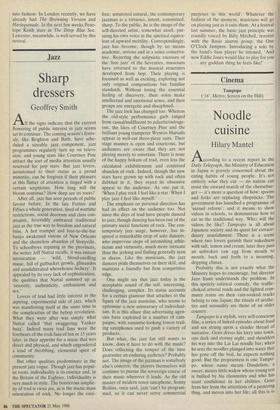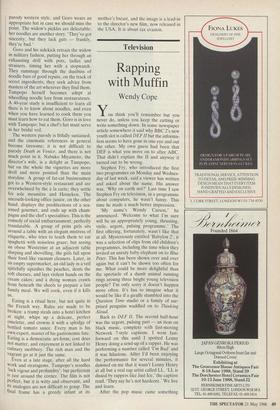Cinema
Tampopo ('18', Metro; Screen on the Hill)
Noodle cuisine
Hilary Mantel
According to a recent report in the Daily Telegraph, the Ministry of Education in Japan is gravely concerned about the eating habits of young people. It's not entirely what they eat — no nation can resist the onward march of the cheesebur- ger — it's more a question of how: spoons and forks are replacing chopsticks. The government has launched a programme of 'utensil reform'; and it means to show videos in schools, to demonstrate how to eat in the traditional way. Whzt will the videos be like? Tampopo is all about Japanese society and its quest for extraor- dinary nourishment. There is a scene where two lovers garnish their nakedness with salt, lemon and cream; later they pass an unbroken raw egg from mouth to mouth, back and forth to a moaning, dripping climax.
Probably this is not exactly what the Ministry hopes to encourage, but director Juzo Itami understands the problem. In this spritely satirical comedy, the traffic- choked arterial roads and the lighted com- muter trains on their rain-soaked tracks belong to one Japan; the rituals of aesthe- tics and sensuality are those of an older country.
Tampopo is a stylish, very self-conscious film, a series of linked episodes about food and sex strung upon a slender thread of narrative. Goro drives his lorry into town, one dark and stormy night, and shoulders his way into the Lai Lai noodle bar; when he sees the noodles plunged into water that has gone off the boil, he expects nothing good. But the proprietress is one Tampo- po, whose name means Dandelion, a sweet, mousy little widow whose young son is bullied by his classmates and who has scant confidence in her abilities. Goro frees her from the attentions of a pestering thug, and moves into her life; all this is 111
parody western style, and Goro wears an appropriate hat in case we should miss the point. The widow's pickles are delectable; her noodles are another story. 'They've got sincerity, but they lack guts , frankly, they're bad.'
Goro and his sidekick retrain the widow in military fashion, putting her through an exhausting drill with pots, ladles and strainers, timing her with a stopwatch. They rummage through the dustbins of noodle bars of good repute, on the track of secret ingredients; they seek advice from masters of the art wherever they find them. Tampopo herself becomes adept at wheedling noodle lore from restaurateurs. A 40-year study is insufficient to learn all there is to know about noodles, and even when you have learned to cook them you must learn how to eat them. Goro is in love with Tampopo; but a chefs hat must serve as her bridal veil.
The western parody is fitfully sustained, and the cinematic references in general become tiresome; it is not difficult to parody Death in Venice, and there is not much point in it. Nabuko Miyamoto, the director's wife, is a delight as Tampopo, but on the whole the vignettes are more droll and more pointed than the main storyline. A group of fat-cat businessmen got to a Western-style restaurant and are overwhelmed by the a la carte; they settle for sole meuniere and Heineken. The uncouth-looking office junior, on the other hand, displays the predilections of a sea- soned gourmet, and ends up with cham- pagne and the chefs specialities. This is the comedy of social embarrassment, perfectly translatable. A group of prim girls sits around a table with an elegant mistress of etiquette, who tries to teach them to eat spaghetti with noiseless grace; but seeing an obese Westerner at an adjacent table slurping and shovelling, the girls fall upon their food like vacuum cleaners. Later, in an empty supermarket, an old lady in a veil spitefully squashes the peaches, dents the soft cheeses, and lays violent hands on the cream cakes; and a dying woman crawls from beneath the sheets to prepare a last family meal. We will cook, even if it kills us.
Eating is a ritual here, but not quite in the French way. Rules are made to be broken: a tramp steals into a hotel kitchen at night, whips up a delicate, perfect omelette, and crowns it with a splodge of bottled tomato sauce. Every man is his own expert, master of his gastronomic fate. Eating is a democratic art-form; cost does not matter, and enjoyment is not linked to culinary snobbery. The rich man and the vagrant go at it just the same.
Even at a late stage, after all the hard work and stratagems, Tampopo's noodles 'lack vigour and profundity'; but perfection is just around the corner. The film is not perfect, but it is witty and observant, and its analogies are not difficult to grasp. The final frame has a greedy infant at its mother's breast, and the image is a lead-in to the director's new film, now released in the USA. It is about tax evasion.































































 Previous page
Previous page